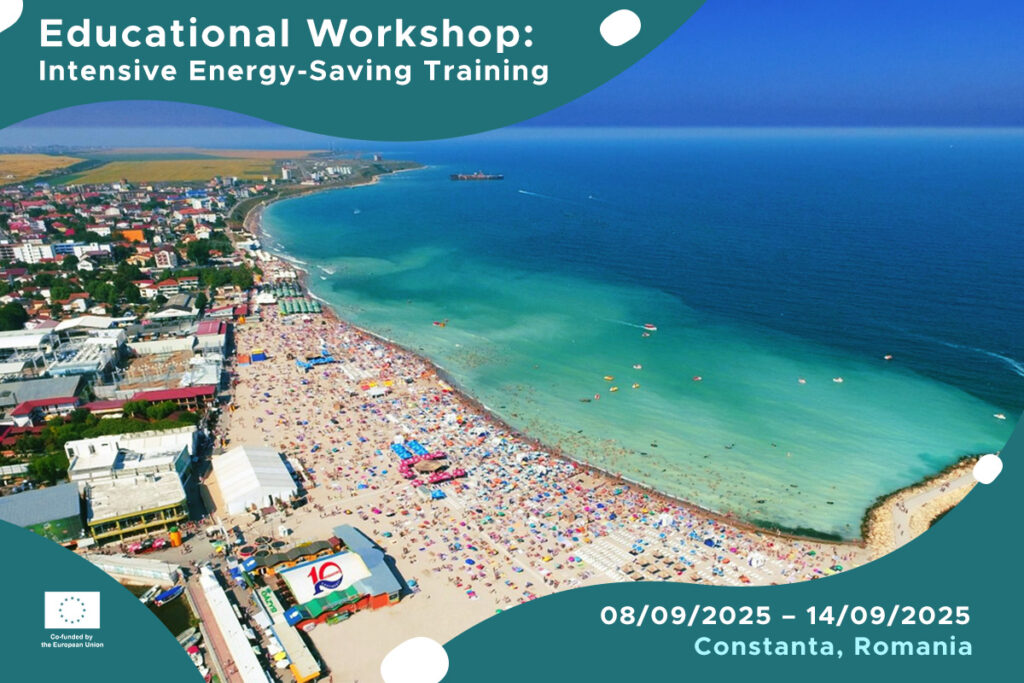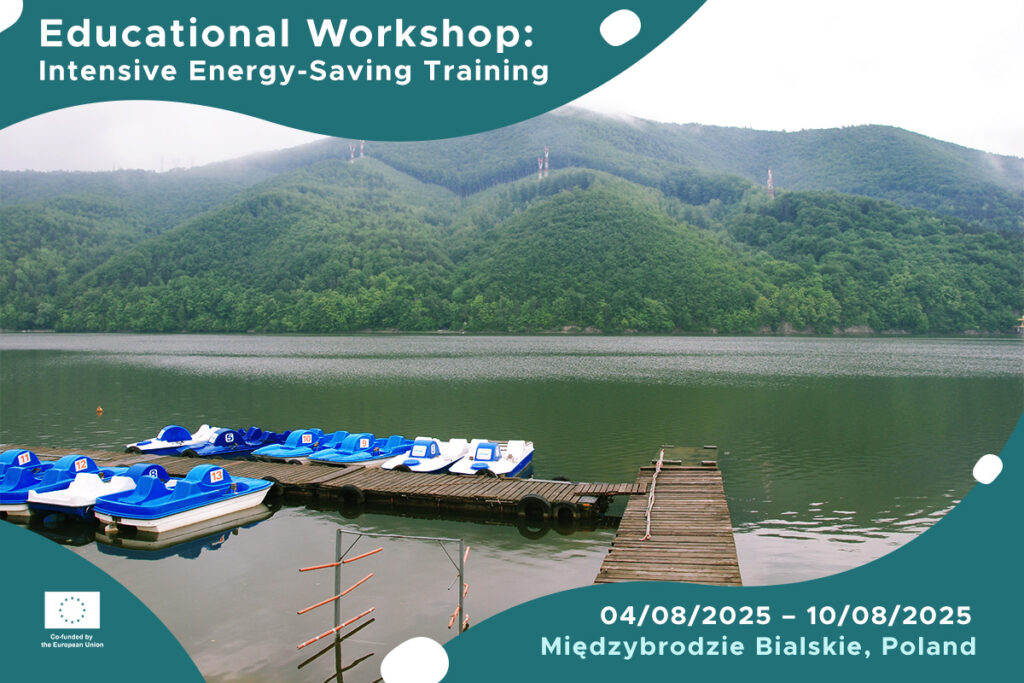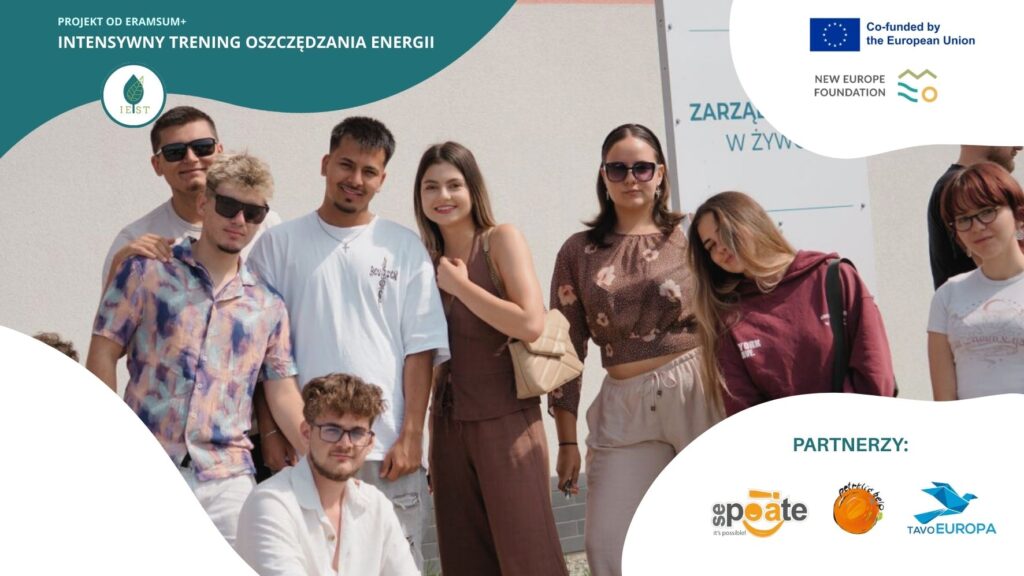Intensive Energy-Saving Training
Termin realizacji:
The project „Intensive Energy Saving Training” focuses on increasing ecological awareness and energy saving among young people (aged 18-30). Our goal is to transform youth into active forces combating the energy crisis, through non-formal education and providing practical knowledge on how to counteract climate change on a daily basis.
We will use interactive educational materials, workshops, and meetings with experts to enhance the quality and innovation of youth work. This will not only increase the understanding of the energy crisis but also help promote initiative and solidarity among young people.
The project takes into account the diversity of the target group, providing access for individuals struggling with economic, geographic, and social barriers as well as for people with disabilities.
As part of the Intensive Energy-Saving Training project, we have developed a range of valuable outcomes to support education on energy saving. We created a modern e-learning platform that provides interactive learning for users.
We produced 10 educational videos and a series of short clips presenting practical energy-saving tips. Additionally, we developed a comprehensive, interactive e-learning course to help participants gain in-depth knowledge in this area. As part of our promotional efforts, we published 15 articles on news portals and recorded 5 podcasts that offer inspiration and practical advice on effective energy management.
Our educational platform is a modern and interactive tool designed to support the learning process. It is built with intuitive navigation and tailored to meet the needs of diverse users. The platform provides access to a variety of educational resources, enables interactive participation in courses, and allows users to track their learning progress. By leveraging modern technologies, it offers an engaging educational experience and supports skill development in a convenient and effective way.
The impact of energy efficiency on the development of economies and communities
Modern society is increasingly aware of the impact of energy consumption and greenhouse gas emissions on the environment and human health. In response to these challenges, the importance of energy efficiency has increased significantly. Increased efficiency leads to a reduction in energy consumption and greenhouse gas emissions, which is key to protecting the environment and improving quality of life. In addition, energy efficiency measures can promote energy equity by improving the availability and affordability of energy services for low-income and marginalized communities, resulting in positive economic and social outcomes.


How can small changes in everyday life save the planet?
„Start with Yourself” is an inspiring guide that encourages beginning a transformation and working on oneself. The content provides practical advice on self-reflection, personal development, and building self-confidence. It emphasizes the importance of understanding one’s own values and goals in order to achieve complete life satisfaction. The authors suggest that real change begins with personal commitment and investment in self-improvement. Overall, the publication is a valuable source of tools and exercises that assist the reader in the daily pursuit of becoming a better version of themselves.
Our educational games created using the Kahoot platform offer an innovative and engaging way to learn. Through dynamic quizzes and a variety of challenges, participants can test their knowledge, reinforce key information, and develop skills in an interactive format. The games combine education with an element of competition—scoring and ranking systems motivate learners to improve their performance. They are available online, allowing for learning anytime and anywhere, both individually and in groups.
By leveraging modern technology, our games make learning more exciting, engaging, and effective. Their interactivity, ease of use, and adjustable difficulty levels make them the perfect tool for developing skills in an accessible and motivating way. Whether you’re studying on your own or participating in workshops, training sessions, or group activities, our quizzes provide a fun and effective learning experience. Try our games today and see how learning can be both productive and enjoyable!
We are happy to announce that as part of the Intensive Energy Saving Training (IEST) project, we have launched a new international youth network called YouthWeb IEST. It is a space that brings together young people from Poland, the Czech Republic, Romania, and Lithuania to inspire each other, gain knowledge, and exchange experiences related to ecology and energy saving.
Sepoate is a partner in the Intensive Energy Saving Training project, specializing in environmental education and the promotion of energy efficiency. The organization develops innovative educational materials, conducts training for VET teachers, and supports the implementation of green technologies. With experience in Erasmus+ projects, Sepoate brings valuable knowledge and practices that foster sustainable development to the partnership.
Petrklíč help is a partner in the Intensive Energy Saving Training project, focusing on social innovation, community development, and environmental awareness. The organization is experienced in working with youth and vulnerable groups, promoting inclusive education and sustainable lifestyles. Through its engagement in Erasmus+ projects, Petrklíč help contributes with practical expertise and creative approaches that support active citizenship and ecological responsibility.
TAVO Europe is a partner in the Intensive Energy Saving Training project, specializing in vocational education, skills development, and green transformation. The organization designs and implements training programs that promote energy-saving practices and sustainable innovation. With strong experience in international cooperation through Erasmus+ projects, TAVO Europe contributes valuable know-how in engaging learners and educators in the transition toward a more energy-efficient and environmentally conscious society.

Funded by the European Union. Views and opinions expressed are however those of the author(s) only and do not necessarily reflect those of the European Union or the European Education and Culture Executive Agency (EACEA). Neither the European Union nor EACEA can be held responsible for them.









